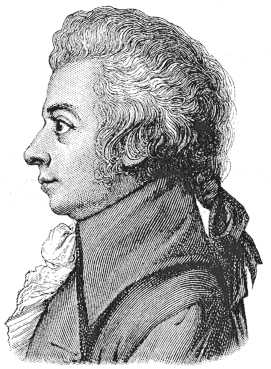Beaumarchais & Mozart
Today, you will go dancing, but genius will play the tune. The University of Houston's College of Engineering presents this series about the machines that make our civilization run, and the people whose ingenuity created them.
Mozart wrote The Marriage of Figaro for a new market -- for the public subscription concert. He was an early pioneer of listener-supported music. You couldn't be very radical when you wrote for royal patrons. Here you had means for taking your case to the people.
It was 1786. Revolution was afoot. Mozart's librettist adapted The Marriage from a play by a French clockmaker, born Pierre Caron. When he was only 19, Caron invented a fine new clock escapement mechanism. That earned him enough money to run with the rich. He married a wealthy widow. He took the fancy name of Beaumarchais.
By the age of 27, he was teaching harp to Louis XV's daughters. He had a nose for court intrigue. He soon gained the title of Count Beaumarchais. He moved from mechanics to music to social climbing. Then he took up play-writing. And his plays supported the cause of revolution -- from inside the palace walls.
His best known works were the original Barber of Seville and Marriage of Figaro. The Marriage came out after a long bout with French censors -- the same year Mozart began his concert series.
Beaumarchais's plays were fast-moving comedies about clever servants who outwitted the nobility. You've all heard Mozart's Figaro singing behind Count Almaviva's back: "You may go dancing, but I'll play the tune." So Mozart also allied himself with 18th-century Revolution.
But Mozart's genius is not so easily named. The Marriage ends with the famous garden scene. Six characters meet in a terribly convoluted plot of mistaken identity. Count Almaviva is finally unmasked as a philanderer, trying to seduce Figaro's fiancee. It reads like Opera Buffa, but Mozart's mind is in another place.
The scene ends as Almaviva seeks and gains the Countess's forgiveness. Mozart takes a few throw-away lines of repentance and weaves them into a musical glory. He transforms a farce about revolution into a great celebration of reconciliation. He does it all in a wondrously complex sextet that defies gravity and lifts us above farce and venality. By musical means alone, he leads us to the finest of all human acts -- to forgiveness.
Beaumarchais and Mozart were both more than they seemed to be. Beaumarchais: the inventor who became a playwright -- the aristocrat who served revolution. Mozart: the composer who seemed to embrace revolution -- then speaks to us as a moral theologian. In the end, genius of such size always outwits us. It does indeed set us dancing to tunes we had not expected to hear.
I'm John Lienhard, at the University of Houston, where we're interested in the way inventive minds work.
(Theme music)
Raynor, H., A Social History of Music. New York: A Crescendo Book, 1978, Chapter 18.
Bronowski, J., The Ascent of Man. Boston: Little, Brown and Company, 1973, Chapter 8, "The Drive for Power."
Kerman, J., Opera as Drama. New York: Albert A. Knopf, 1956, Chapter 4, "Mozart."
See also the Encyclopaedia Britannica entry under Beaumarchais.

clipart
Wolfgang Amadeus Mozart